Depleted Uranium Bill (SENATE BILL SB 6732) Made it out of Committee!
Please contact members of the Senate Ways and Means Committee to tell them SB 6732 is on the way and why it needs to be passed.
Group and Friends,
Thank you for your attention and taking rapid action below...much appreciated. Please send along a quick email reply once you've taken action. Questions? please ask...
MFSO, Washington state chapter congratulations to the team that put this together and put it forth; thank you.
Respect, Peace, Solidarity
Lietta Ruger, member Military Families Speak Out
military family with 2 Iraq veterans,
PO Box 335
Bay Center, WA 98527
home phone: 360-875-6380
cell phone: 360-942-9169
email: rugerla@centurytel.net
website: Military Families Speak Out, Washington state
RAPID ACTION REQUEST
SENATE BILL SB 6732 (studying military uranium exposure) made it out of committee! Senate Health, voted "majority, do pass, and refer to Ways and Means."
View online progress and reports at SB6732
Also including text of the pdf adobe report of the State Senate hearings held on this bill in Olympia Feb 2, 2006.
Suggestion that you send e-mails or call those that you know or are in your districts on the Senate Ways and Means and alert them that the Senate Bill 6732 is coming.
Use two or three sentences about what it will do and why it needs to be passed this year (troops are coming home).
Suggestion not go into great detail about anything, just let them know we want their support.
These are the names and a comment or two about the Committee members of the Senate Ways and Means.
Please act rapidly as this will be a very short turn around for them.
Margarita Prentice, D, 11, Chair, lives in Renton, is a nurse. Karen Fraser, D, 22, Vice-Chair, Lives in Thurston, was part of Nuclear Waste Round Table.
Mark Doumit, D, 19, Vice-Chair, Grays Harbor area,
Joseph Zarelli, R, 18, Ranking Minority, Woodland area, 6 years active duty 82-89.
Dale Brandland, R, 42, Belllingham, Navy 68-69, Sheriff.
Darlene Fairlay, D, 32, Redmond/Edmonds, ex overseas volunteer.
Mike Hewitt, R, 16, Walla Walla, Tri-Cities.
Jeanne Kohl-Welles, D, 36, Seattle, All around person.
Linda Evans Parlette, R, 12, Wenatchee, BS in Pharmacy, Health care is an interest.
Craig Pridemore, D, 49, Vancouver, current active duty vet.
Marilyn Rasmussen, D, 2, Pierce County, Fort Lewis, Tacoma.
Debbie Regala, D, 27, Tacoma, Pierce, Doing something with Habitat.
Pam Roach, R, 31, Auburn, Has done international teaching, volunteer?
Mark Schoesler, R, 9, Spokane, farmer.
Mrs. Pat Thibaudeau, D, 43, Seattle, interest in health.
SENATE BILL REPORT
SB 6732
As Reported By Senate Committee On:
Health & Long-Term Care, February 2, 2006
Title: An act relating to exposure to depleted uranium and other hazardous materials by members and veterans of the national guard.
Brief Description: Studying military uranium exposure.
Sponsors: Senators Franklin and Rasmussen.
Brief History:
Committee Activity: Health & Long-Term Care: 2/2/06 [DP-WM].
SENATE COMMITTEE ON HEALTH & LONG-TERM CARE
Majority Report: Do pass and be referred to Committee on Ways & Means.
Signed by Senators Keiser, Chair; Thibaudeau, Vice Chair; Franklin, Kastama, Kline and Poulsen.
Staff: Sharon Swanson (786-7447)
Background:
Depleted uranium is what is left over when most of the highly radioactive isotopes of uranium are removed for use as nuclear fuel or nuclear fuel weapons. The depleted uranium is used in armor-piercing munitions and in enhanced armor protection for some Abrams tanks. Heavy metals such as uranium, tungsten, and lead have chemical toxicity properties that, in high doses, can cause adverse health effects.
Depleted uranium was used extensively in place of tungsten for ammunition by the United States and United Kingdom in the first Gulf War. A report issued by the Hague Peace Conference, dated May, 1999, states that at least 320 tons of depleted uranium was "lost" during the first Gulf War and that much of that was converted at high temperature into an aerosol, creating a mist or fog.
Once inhaled, very small particles of depleted uranium can reside in the lungs for years, slowly passing through the lung tissue into the blood. Uranium can be stored in bone, lymph, liver, kidney, or other tissues. Eventually, all uranium that gets into the bloodstream ends up in the kidneys prior to expulsion through urine.
Summary of Bill: Effective October 1, 2006, the Adjutant General of the Washington State National Guard is required to assist any eligible member or veteran in obtaining federal treatment services, who:
l) Has been assigned a risk level I, II, or III for depleted uranium exposure by his or
her branch of service; 2) Is referred by a military physician; or
Senate Bill Report - 1 - SB 6732
3) Has reason to believe that he or she was exposed to depleted uranium during service.
Eligible member is defined as a member of the Washington National Guard who served in the Persian Gulf War, or in an area designated as a combat zone during Operation EnduringFreedom or Operation Iraqi Freedom.
The bill directs the Adjutant General to submit a report on the scope and adequacy of training received by members of the National Guard on exposure to depleted uranium.
Additionally, the report must include an assessment of the feasibility and cost of adding pre-deployment training concerning potential exposure to depleted uranium and other toxic chemical substances and the precautions recommended under combat and non-combat conditions.
The report is due by October 1, 2006.
A task force which includes the Secretary of the Department of Health, or designee, the Adjutant General, the Director of Veterans Affairs, six legislative members, and additional members totaling fifteen is created. The task force is directed to complete several tasks by January 31, 2007, specifically:
1) initiate a health registry; 2) develop a plan for outreach to affected military personnel; and
3) prepare a report on potential exposure to depleted uranium
and recommendations for precautions to be taken.
Appropriation: None.
Fiscal Note: Available.
Committee/Commission/Task Force Created: Yes.
Effective Date: Ninety days after adjournment of session in which bill is passed.
Testimony For:
The United States government and military has a history of lying to its veterans. In Vietnam, it was agent orange. Many veterans returned home to a life of cancer, children with birth defects, and eventually death. The military claimed to not know about agent orange.
Our new veterans returning home from Iraq face similar challenges. We need to force the military to perform the proper tests to determine uranium poisoning.
The current test only looks for uranium in urine. That test is only good for thirty days. The conclusive testing must look at blood results, tissue testing, and must be able to detect microscopic particles.
Depleted uranium becomes microscopic. Troops breath it in and it settles in the lungs.
In Mississippi, returning Persian Gulf male veterans are 1.7 times more likely to father children with birth defects. Female Persian Gulf veterans are 2.4 times more likely to give birth to a child with birth defects.
This is only the beginning.
England and Germany are conducting the proper tests. The United States needs to do the same for their veterans.
Testimony Against: None.
Who Testified:
PRO:
Terrence Zander, Veterans for Peace
Jerry Muchmore, Veteran
George Hill, M.D.
Peter Von Christierson, Depleted Uranium Study Team
Col. Ron Weaver, Washington Military Department
Harvey Brooks, National Association of Black Veterans
Note: Written testimony by MFSO was provided and entered into the testimony record. While time was allotted to MFSO representative (Lietta Ruger) to give oral testimony, due to the time limitations allowing for approximately 2 minutes to each testimony, choice made for MFSO representation to provide written testimony and yield more time to others presenting oral testimony.






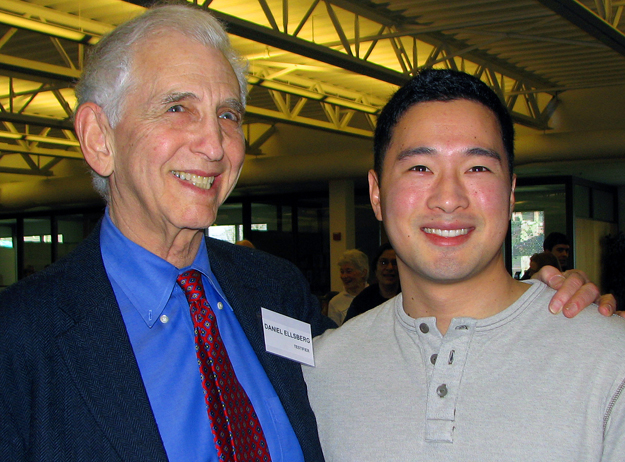
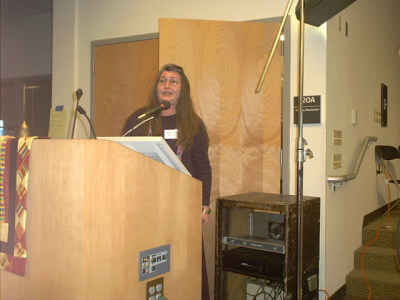
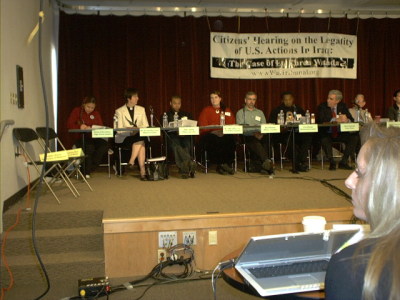 (photo - on the Panel - Elizabeth Falzone - GSFSO/ MFSO - WA chapter and Rich Moniak - MFSO - Alaska chapter listen to two days of testimony)
(photo - on the Panel - Elizabeth Falzone - GSFSO/ MFSO - WA chapter and Rich Moniak - MFSO - Alaska chapter listen to two days of testimony)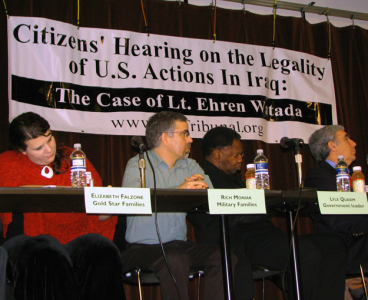
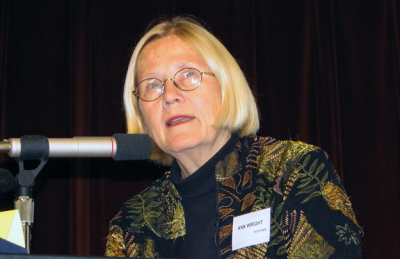

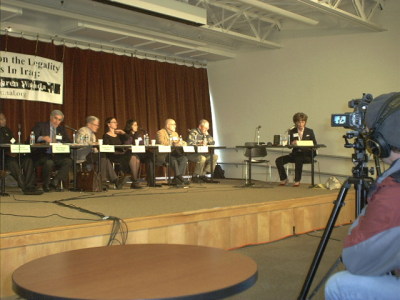 (photo - Stacy Bannerma, wife of returning Iraq veteran - WA Natl Guard, gives testimony)
(photo - Stacy Bannerma, wife of returning Iraq veteran - WA Natl Guard, gives testimony)
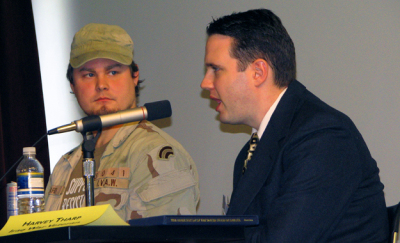
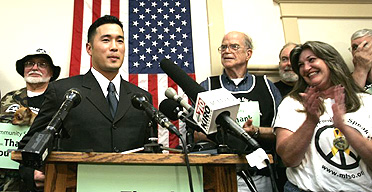 (photo Lietta Ruger, MFSO- WA, in support Lt. Ehren Watada, June 2006, Tacoma, WA)
(photo Lietta Ruger, MFSO- WA, in support Lt. Ehren Watada, June 2006, Tacoma, WA)
 (photo - Lietta Ruger, Judy Linehan, Jenny Keesey - from MFSO - WA chapter, June 2006, Tacoma, WA)
(photo - Lietta Ruger, Judy Linehan, Jenny Keesey - from MFSO - WA chapter, June 2006, Tacoma, WA) (photo - Judy Linehan, MFSO - WA at support rally for Lt. Watada, June 2006, Tacoma, WA)
(photo - Judy Linehan, MFSO - WA at support rally for Lt. Watada, June 2006, Tacoma, WA)





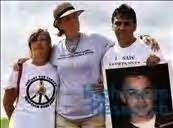
 photo - Sue Niederer, MFSO. Her son U.S. Army 2nd Lt.Seth Dvorin, 24 yrs old was killed in Iraq Feb 3, 2004.
photo - Sue Niederer, MFSO. Her son U.S. Army 2nd Lt.Seth Dvorin, 24 yrs old was killed in Iraq Feb 3, 2004. photo - Nancy Lessin, MFSO Co-Founder
photo - Nancy Lessin, MFSO Co-Founder  photo - Lietta Ruger, MFSO - WA
photo - Lietta Ruger, MFSO - WA  photo - Stacy Bannerman, MFSO - WA
photo - Stacy Bannerman, MFSO - WA



